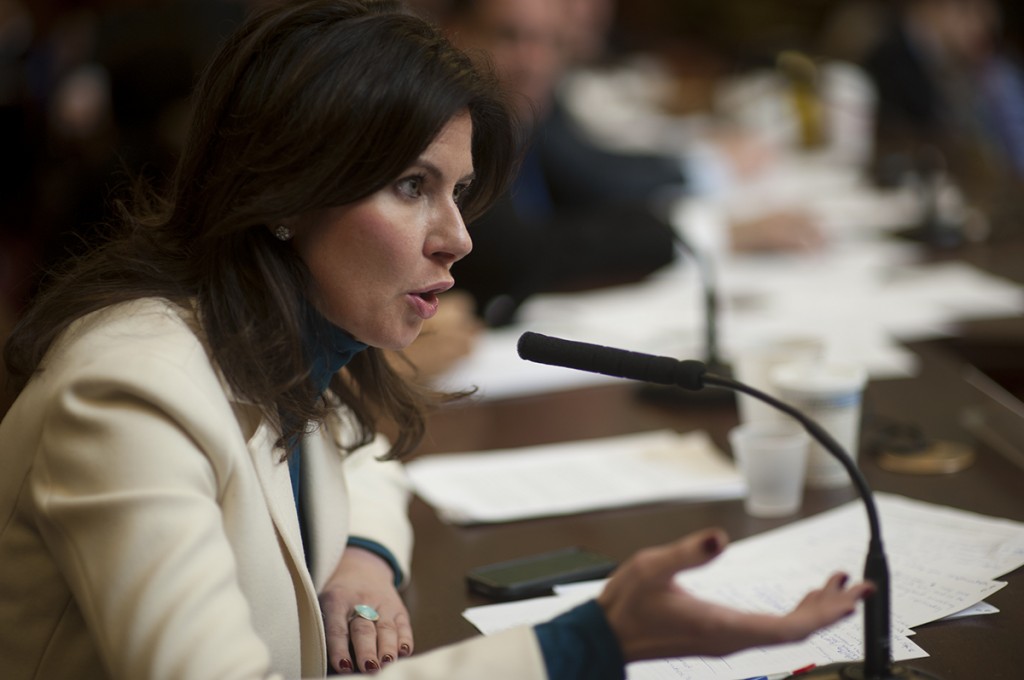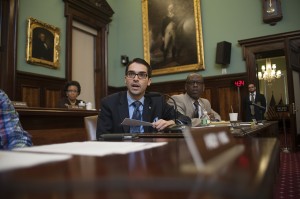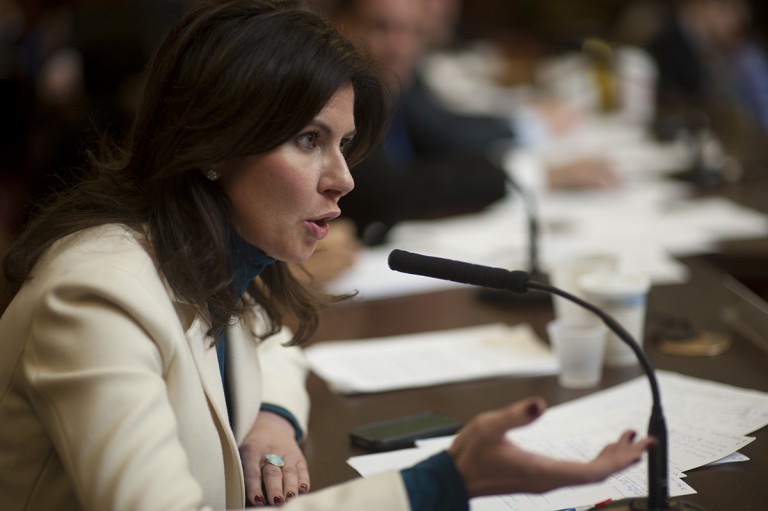
Councilwoman Elizabeth Crowley said she was disappointed that Mayor Bill de Blasio’s proposed budget does not include additional funding for EMS or for an increased police force. Photo by William Alatriste/NYC Council
Mayor Bill de Blasio’s proposed $73.9 billion budget for the city drew both criticism and praise from Queens leaders this week, with some slamming the plan as ignoring the needs of veterans and not allocating enough for additional police and others lauding it for boosting education efforts and supporting Hurricane Sandy victims.
“The needs and concerns of veterans must be a priority for this administration,” said Councilman Eric Ulrich (R-Ozone Park), chairman of the Council’s Committee on Veterans. “The executive budget proposed last week ignores the Council’s request to increase funding for the mayor’s Office of Veteran Affairs, as well as many other desperately needed veterans’ initiatives.”

Councilman Eric Ulrich criticized the mayor’s budget plan, saying it does not provide the necessary support for the city’s veterans. Photo by William Alatriste/NYC Council
Ulrich went on to say that, with service members returning home from places like Iraq and Afghanistan, it is crucial to provide support for them.
“What programs will be in place to assist them transition back into civilian life?” he asked. “If we’re serious about helping veterans with housing, employment, mental health, and other important issues, then we must bridge the gap in care and increase funding during the negotiation process.”
Releasing the financial document last week, de Blasio detailed the proposal that would increase spending by 6 percent, compared to last year’s plan, and included increases in spending on education and social services. Unlike his predecessor, former Mayor Michael Bloomberg, de Blasio did not propose any service cuts or new channels of revenue.
The City Council and the mayor must agree on a budget by the new fiscal year, which begins July 1.
The budget proposal “invests in our children, creates economic opportunity for more New Yorkers, dramatically expands affordable housing in New York City, protects the most vulnerable citizens, and makes the city safer,” according to a press release from the de Blasio administration.
Councilwoman Elizabeth Crowley (D-Middle Village), who chairs the Council’s Committee on Fire and Criminal Justice, however, said she was disappointed in a lack of additional funding for EMS and an increased police force.
“With an average EMS response time for life-threatening emergencies exceeding nine minutes, our officers are spread too thin,” Crowley said. “We cannot be cutting corners in regards to public safety when lives are on the line.”
But Councilman Jimmy Van Bramer (D-Sunnyside) said the proposal provides much-needed funding for education – including $20 million for certified arts teachers and expanding arts in schools, which the lawmaker called “an enormous step forward toward increasing cultural access for kids in every neighborhood.”
And Council Speaker Melissa Mark-Viverito (D-Manhattan) and Councilwoman Julissa Ferreras (D-East Elmhurst), chairperson of the Council’s Finance Committee, cited, among a number of issues, the budget’s focus on Sandy recovery.
“By investing in Build It Back – including expanded eligibility and additional staff, such as building inspectors, the administration will expedite relief, while engaging communities and creating local jobs,” the mayor’s office said in a press release in regards to the program set up to help those devastated by the storm rebuild their homes. “Additionally, the administration will provide financial relief to Sandy victims through water bill, property tax, and building fee relief, as well as expanded rental assistance eligibility.”
Calling de Blasio’s proposal “a strong start,” Mark-Viverito and Ferreras said they were pleased to see it supporting an expansion of summer youth employment opportunities and affordable housing but said they were “disappointed to see that while the executive budget addresses skyrocketing overtime costs for the NYPD, it does not include funding to hire the additional 1,000 police officers needed to reduce understaffing at city precincts.”
De Blasio emphasized that the budget includes support for settling contracts for city workers, including the United Federation of Teachers; funding for full-day universal pre-K programs; and a reduction of “arbitrary and overly punitive” business fines. Total fine revenues in the executive budget are projected to decline from $859 million in 2012 to $789 million in 2015 – representing an 8 percent decrease.
“Under the previous administration, small businesses were charged thousands of dollars in fines, hindering their chance to grow and support communities in Queens and throughout the city,” said Queens Chamber of Commerce Executive Director Jack Friedman. “Mayor de Blasio’s reduction in fines will help these businesses invest back into their communities, increasing residents’ quality of life.”
By Anna Gustafson

